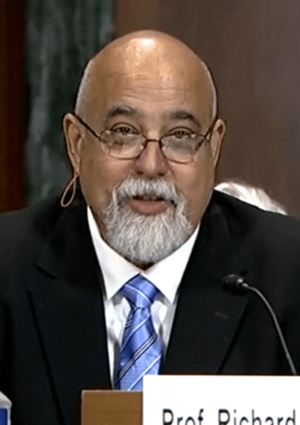Richard E. Myers II facts for kids
Quick facts for kids
Richard E. Myers II
|
|
|---|---|
 |
|
| Chief Judge of the United States District Court for the Eastern District of North Carolina | |
| Assumed office January 1, 2021 |
|
| Preceded by | Terrence Boyle |
| Judge of the United States District Court for the Eastern District of North Carolina | |
| Assumed office December 10, 2019 |
|
| Appointed by | Donald Trump |
| Preceded by | Malcolm Jones Howard |
| Personal details | |
| Born | 1967 (age 58–59) Kingston, Jamaica |
| Education | University of North Carolina, Wilmington (BA, MA) University of North Carolina, Chapel Hill (JD) |
Richard Ernest Myers II (born 1967) is an American judge who serves as the Chief Judge for a very important court in North Carolina. This court is called the U.S. District Court for the Eastern District of North Carolina.
He was chosen for the job by President Donald Trump in 2019. Before becoming a judge, he was a professor at the University of North Carolina School of Law, where he taught students about law.
Contents
Early Life and Schooling
Richard Myers was born in 1967 in Kingston, Jamaica. When he was a child, his family moved to Wilmington, North Carolina.
He was a very good student. He went to the University of North Carolina at Wilmington and earned two degrees: a Bachelor of Arts in 1989 and a Master of Arts in 1994. He graduated summa cum laude, which is a Latin phrase meaning "with the highest honors."
Before going to law school, Myers worked as a newspaper reporter from 1991 to 1995. He even covered the famous case involving the death of Michael Jordan's father, James R. Jordan Sr..
Later, he decided to study law at the University of North Carolina School of Law. He did extremely well there, too. He graduated in 1998 with a JD (a degree in law), magna cum laude (meaning "with great honor").
Career in Law and Teaching
After finishing law school, Myers started his career in the legal world. First, he worked as a law clerk for Judge David B. Sentelle, helping the judge with research and cases.
He then worked as a lawyer for a private company. After that, he became a federal prosecutor, which is a lawyer who works for the government to prove that someone has broken a federal law. He worked on many different types of cases.
In 2004, Myers became a professor at the University of North Carolina School of Law. He taught students about criminal law and how to be a good lawyer in a courtroom. He was a popular teacher and stayed at the university until he became a judge in 2019.
Becoming a Federal Judge
In the United States, federal judges are chosen by the President and must be approved by the Senate.
How He Was Chosen
On August 14, 2019, President Donald Trump announced that he wanted to nominate Myers to be a federal judge. The judge's seat he was chosen for had been empty for a very long time—since 2005! It was the longest-lasting empty spot for a judge in the country at the time.
The Senate reviewed his nomination. On December 5, 2019, the Senate voted to confirm him as a judge. He officially started his job on December 10, 2019. Just over a year later, in January 2021, he became the Chief Judge of his court.
A Notable Court Decision
In 2022, Judge Myers made a decision in a case about a law from 1872. This law was passed after the American Civil War. The case was about a part of the 14th Amendment to the U.S. Constitution. This part says that people who support an insurrection (a rebellion against the government) cannot hold public office.
Judge Myers ruled that the 1872 law canceled out that part of the 14th Amendment, not just for people from the Civil War era, but for all future situations. However, a higher court, called an appeals court, later disagreed. The appeals court said the 1872 law only applied to people involved in the Civil War.
Memberships
Judge Myers has been a member of several organizations related to law and his personal interests.
- He has been part of the Federalist Society, a group for lawyers and law students, since 2004.
- He has been a member of the National Rifle Association of America since 2010.
- He is also a member of the Christian Legal Society.
See also
 | Delilah Pierce |
 | Gordon Parks |
 | Augusta Savage |
 | Charles Ethan Porter |

